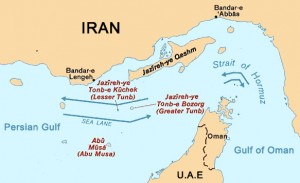Iran’s threat to Global Oil Prices
The situation in Iran is becoming a serious threat to global oil supplies.
As Iran claims to become closer to building the capacity to develop a nuclear weapon, the rest of the world, led by the U.S., has worked to ratchet up sanctions. The U.S. has had an economic embargo on all imports from Iran since the fall of the Shah in 1979. Just last week, President Obama signed legislation to strengthen those sanctions by imposing restrictions on the Iranian central bank, making it harder for them to sell their oil. This is already causing problems for their economy, with a run on the Iranian Rial.
There’s many moving parts in this situation, and I won’t pretend to be an Iran-policy expert. However, as Europe and the U.S. move towards more sanctions on Iran, the response from Iran could have significant impacts on global energy markets.
Iran is the 5th largest oil producer in the world, with about 4.2 million barrels per day. In addition, Iran sits perched on top of the Strait of Hormuz, through which over 15 million barrels of oil per day transit – about 20% of the world’s consumption. Iran claims that the Strait of Hormuz is an inland waterway under international Maritime Law, but virtually no other country recognizes that claim. Instead, the Strait of Hormuz is recognized as an international waterway through which safe passage is guaranteed.

Earlier this week, the Iranian military threatened to close the Straits of Hormuz to oil traffic, while also cheering the
routine departure of the U.S. aircraft carrier John C. Stennis. Around 20% of global oil consumption passes through this strait every day, making it the world’s most important choke-point for oil. The threat of closing the Strait of Hormuz alone has already pushed oil prices back up above $100 a barrel. Traders, quoted in the NY Times, say that an actual closure of the Straits would push oil prices up by “$50 per barrel or more” in just days.
The U.S. Fifth Fleet, based in Bahrain, has been the guarantor of safe passage throughout the Persian Gulf since the 1970s. Any military action to impede traffic through the Strait would be a de facto breach of international law, and a response would be justified. This should not simply be a U.S. Navy operation, as some claim. Instead, it should be a joint operation with all of our Persian Gulf allies against a clear breach of international law.
But – any military operation would have severe consequences for the U.S. economy, because of our dependence on oil, as ASP has written. The U.S. is slowly developing some resilience to this threat by increasing average fuel economy and diversifying auto fuel sources, but American consumers should prepare for significant hardship if military action comes. Reason enough to do everything possible to avoid that.





